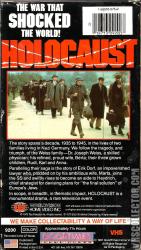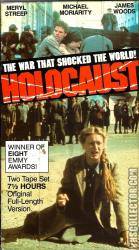Holocaust
Catalog Number
9200
-
Primary Distributor (If not listed, select "OTHER")
Catalog Number
9200
Primary Distributor (If not listed, select "OTHER")
Release Year
Country
N/A (NTSC)
N/A | N/A | N/A
N/A | N/A
Second Distributor
Holocaust (1978)
Additional Information
Additional Information
The story of man's inhumanity to man.
A tense and deeply disturbing dramatization of the horrible Nazi crimes of the second World War. The story line focuses on two German families, one Jewish, and one which thrived under the Nazi regime.
Holocaust is an American television miniseries broadcast in four parts in 1978 on the NBC television network. The series tells the story of the Holocaust from the perspective of the (fictional) Weiss family of German Jews and that of a rising member of the SS, who gradually becomes a merciless war criminal. Holocaust highlighted numerous important events which occurred up to and during World War II, such as Kristallnacht, the creation of Jewish ghettos and later, the use of gas chambers. Although the miniseries won several awards and received critical acclaim, it was criticized by some, including noted Holocaust survivor and author Elie Wiesel, who described it as "untrue and offensive."[1]
The series was presented in four parts:
Part 1: The Gathering Darkness (original airdate: April 16, 1978)
Part 2: The Road to Babi Yar (original airdate: April 17, 1978)
Part 3: The Final Solution (original airdate: April 18, 1978)
Part 4: The Saving Remnant (original airdate: April 19, 1978)
Some critics accused the miniseries of trivializing the Holocaust. The television format meant the realism of the situation was muted, while the fact that NBC made a financial gain from advertising led to accusations that the tragedy was being commercialized. Holocaust's creators defended it by arguing that it was an important factor in developing and maintaining awareness of the Holocaust. The television critic Clive James commended the production. Writing in The Observer (reprinted in his collection The Crystal Bucket), he commented:
The German Jews were the most assimilated in Europe. They were vital to Germany's culture—which, indeed, has never recovered from their extinction. They couldn't see they were hated in direct proportion to their learning, vitality and success. The aridity of the Nazi mind was the biggest poser the authors had to face. In creating Erik Dorff they went some way towards overcoming it. Played with spellbinding creepiness by Michael Moriarty, Erik spoke his murderous euphemisms in a voice as juiceless as Hitler's prose or Speer's architecture. Hitler's dream of the racially pure future was of an abstract landscape tended by chain-gangs of shadows and crisscrossed with highways bearing truckloads of Aryans endlessly speeding to somewhere undefined. Dorff sounded just like that: his dead mackerel eyes were dully alight with a limitless vision of banality.[2]
Moreover, the Polish community in the United States found controversial and untrue that soldiers who were supervising transports of Jews and were executing them during Warsaw Ghetto Uprising were dressed in Polish military uniforms.[citation needed]
With an estimated viewership of up to 15 million households, Holocaust turned out to be extremely popular during its initial airing in West Germany in 1979, which led to an increase in public interest for the crimes committed during the Nazi era. In January 1979, Holocaust aired in West Germany.[3] The series which was watched by 20 million people or 50 percent West Germans first brought the matter of the genocide in World War II to widespread public attention in a way that it never been before.[3] After each part of Holocaust was aired, there was a companion show where a panel of historians could answer questions from people phoning in.[3] The historian's panels were literally overwhelmed with thousands of phone calls from shocked and outraged Germans, a great many of whom stated that they were born after 1945 and that was the first time that they learned that their country had practiced genocide in World War II.[3] The German historian Alf Lüdtke wrote that the historians "could not cope" as they were faced with thousands of angry phone-callers asking how these things could happen or why they had never learned about them at school.[3] Subsequently the Gesellschaft für deutsche Sprache named the term "Holocaust" as German Word of the Year
Chosen as the Outstanding Limited Series (1977-78) at Emmy Award time, this original drama about two German families that are affected by events between 1935 and 1945 rivaled "Roots" in its impact on viewers in this country and sparked controversy throughout Europe as it premiered on television in one country after another. Gerald Green also won an Emmy Award for his teleplay about a Jewish family's desperate fight for survival and the parallel story of a young German lawyer, a family friend, who rises to power as an influential Nazi official.
Michael Moriarty (the lawyer), Meryl Streep (the Catholic girl who marries into the Jewish family), and one-time sex symbol Carroll Baker's daughter, Blanche (making her acting debut as the family's youngest daughter who becomes a Nazi victim after going mad following an assault) won Emmys for their performances, as did Marvin Chomsky for his direction, Morton Gould for his music score and Peggy Farrell and Edith Almoslino for their costumes.
Emmy nominations (16 in all) also were given to Fritz Weaver, Rosemary Harris, Sam Wanamaker, David Warner and Tovah Feldshuh as well as production designer Wilfrid J. Shingleton and supervising editor Stephen A. Rotter.
A tense and deeply disturbing dramatization of the horrible Nazi crimes of the second World War. The story line focuses on two German families, one Jewish, and one which thrived under the Nazi regime.
Holocaust is an American television miniseries broadcast in four parts in 1978 on the NBC television network. The series tells the story of the Holocaust from the perspective of the (fictional) Weiss family of German Jews and that of a rising member of the SS, who gradually becomes a merciless war criminal. Holocaust highlighted numerous important events which occurred up to and during World War II, such as Kristallnacht, the creation of Jewish ghettos and later, the use of gas chambers. Although the miniseries won several awards and received critical acclaim, it was criticized by some, including noted Holocaust survivor and author Elie Wiesel, who described it as "untrue and offensive."[1]
The series was presented in four parts:
Part 1: The Gathering Darkness (original airdate: April 16, 1978)
Part 2: The Road to Babi Yar (original airdate: April 17, 1978)
Part 3: The Final Solution (original airdate: April 18, 1978)
Part 4: The Saving Remnant (original airdate: April 19, 1978)
Some critics accused the miniseries of trivializing the Holocaust. The television format meant the realism of the situation was muted, while the fact that NBC made a financial gain from advertising led to accusations that the tragedy was being commercialized. Holocaust's creators defended it by arguing that it was an important factor in developing and maintaining awareness of the Holocaust. The television critic Clive James commended the production. Writing in The Observer (reprinted in his collection The Crystal Bucket), he commented:
The German Jews were the most assimilated in Europe. They were vital to Germany's culture—which, indeed, has never recovered from their extinction. They couldn't see they were hated in direct proportion to their learning, vitality and success. The aridity of the Nazi mind was the biggest poser the authors had to face. In creating Erik Dorff they went some way towards overcoming it. Played with spellbinding creepiness by Michael Moriarty, Erik spoke his murderous euphemisms in a voice as juiceless as Hitler's prose or Speer's architecture. Hitler's dream of the racially pure future was of an abstract landscape tended by chain-gangs of shadows and crisscrossed with highways bearing truckloads of Aryans endlessly speeding to somewhere undefined. Dorff sounded just like that: his dead mackerel eyes were dully alight with a limitless vision of banality.[2]
Moreover, the Polish community in the United States found controversial and untrue that soldiers who were supervising transports of Jews and were executing them during Warsaw Ghetto Uprising were dressed in Polish military uniforms.[citation needed]
With an estimated viewership of up to 15 million households, Holocaust turned out to be extremely popular during its initial airing in West Germany in 1979, which led to an increase in public interest for the crimes committed during the Nazi era. In January 1979, Holocaust aired in West Germany.[3] The series which was watched by 20 million people or 50 percent West Germans first brought the matter of the genocide in World War II to widespread public attention in a way that it never been before.[3] After each part of Holocaust was aired, there was a companion show where a panel of historians could answer questions from people phoning in.[3] The historian's panels were literally overwhelmed with thousands of phone calls from shocked and outraged Germans, a great many of whom stated that they were born after 1945 and that was the first time that they learned that their country had practiced genocide in World War II.[3] The German historian Alf Lüdtke wrote that the historians "could not cope" as they were faced with thousands of angry phone-callers asking how these things could happen or why they had never learned about them at school.[3] Subsequently the Gesellschaft für deutsche Sprache named the term "Holocaust" as German Word of the Year
Chosen as the Outstanding Limited Series (1977-78) at Emmy Award time, this original drama about two German families that are affected by events between 1935 and 1945 rivaled "Roots" in its impact on viewers in this country and sparked controversy throughout Europe as it premiered on television in one country after another. Gerald Green also won an Emmy Award for his teleplay about a Jewish family's desperate fight for survival and the parallel story of a young German lawyer, a family friend, who rises to power as an influential Nazi official.
Michael Moriarty (the lawyer), Meryl Streep (the Catholic girl who marries into the Jewish family), and one-time sex symbol Carroll Baker's daughter, Blanche (making her acting debut as the family's youngest daughter who becomes a Nazi victim after going mad following an assault) won Emmys for their performances, as did Marvin Chomsky for his direction, Morton Gould for his music score and Peggy Farrell and Edith Almoslino for their costumes.
Emmy nominations (16 in all) also were given to Fritz Weaver, Rosemary Harris, Sam Wanamaker, David Warner and Tovah Feldshuh as well as production designer Wilfrid J. Shingleton and supervising editor Stephen A. Rotter.







Comments0
Login / Register to post comments